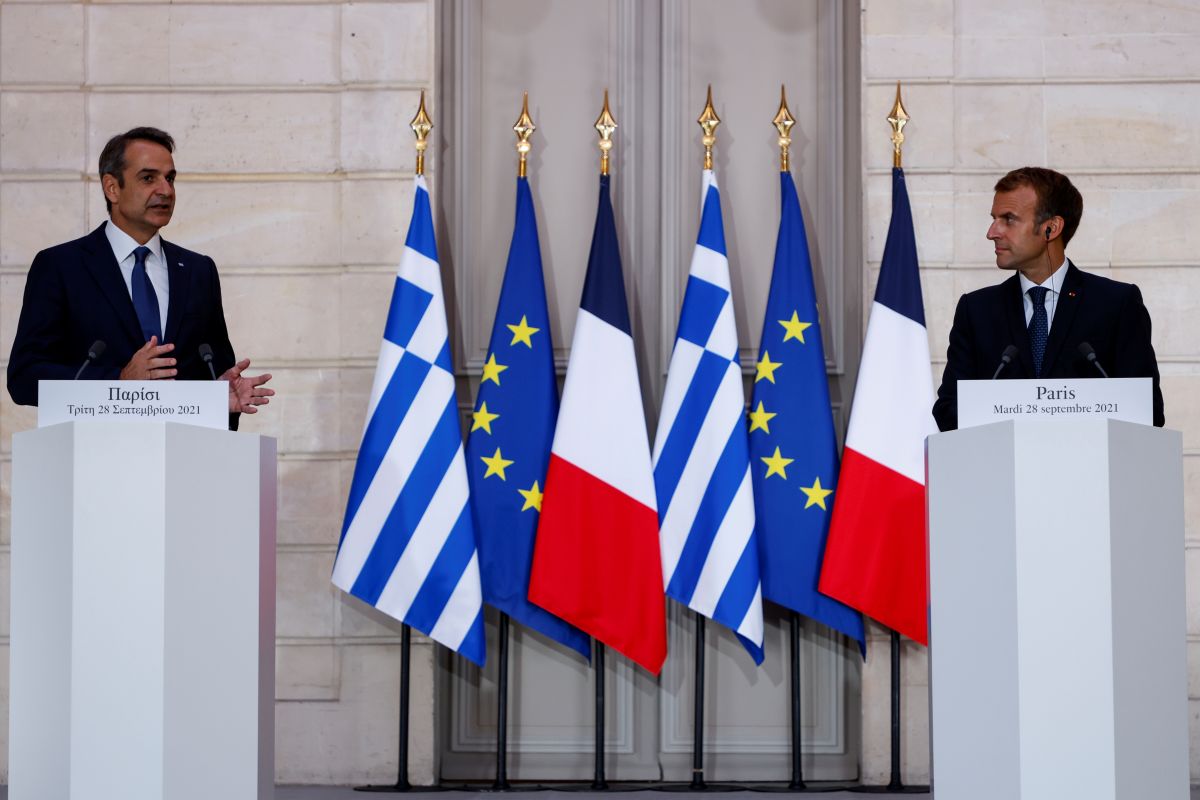Franco-Greek Defence Partnership
The new Franco-Greek defence agreement deepens the countries’ cooperation in the face of Turkey’s revisionist ambitions in the Eastern Mediterranean. The ships ordered by Greece as part of the deal will strengthen that country’s defence capabilities but also help the French Naval Group in its reorganisation caused by the cancellation of the submarine contract by Australia. The agreement with Greece extends the French argument for the EU to strengthen its defence capacity alongside NATO.
 Photo: POOL/Reuters
Photo: POOL/Reuters
What does the Franco-Greek agreement provide?
President Emmanuel Macron and Prime Minister Kyriakos Mitsotakis announced on 29 September a defence cooperation agreement that includes a mutual assistance clause in the event of an “armed attack on the territory of one of them”. The tightening of defence ties is accompanied by a preliminary agreement to build in France by 2026 three FDI-HN frigates (with the option to build a fourth one in a Greek shipyard) for the Greek fleet, worth almost €6 billion. This is a further element of the tightening of military cooperation between France and Greece, which was the first NATO/EU ally to contract 18 multi-role Rafale planes in a deal concluded last year worth €2.5 billion, followed this year by a declaration to purchase another six aircraft. France is also counting on a contract to supply three Gowind corvettes to the Greek fleet.
What is the Greek perception of its security needs?
Traditionally, Greece considers Turkish revisionism to be the main challenge to its security. The Greek fears are intensified by the policy of the Justice and Development Party of the current president, Recep Tayyip Erdoğan, that refer to the Ottoman legacy. It is not only the Cyprus question where Turkey effectively protects the separatist Turkish Republic of Northern Cyprus and Greece supports the Republic of Cyprus, inhabited by ethnic Greeks, that is causing tensions. The authorities in Ankara openly question the 1923 Lausanne Peace Treaty, among others, that established the state’s borders with Greece after World War I. The Greek concerns are also raised by the Turkish policy of fait accompli on the Mediterranean continental shelf. The determination of both sides is evidenced by regular incidents between their navies and air forces.
What is the French context of the concluded agreement?
The French authorities recognise the existence of their domestic arms industry as a pillar of sovereignty. To maintain its profitability, they strive for export contracts. They attach particular importance to encouraging EU countries to purchase French weapons. This is one of the reasons why France is one of the most active supporters of EU strategic autonomy. Moreover, France perceives Turkey as its main rival in the Mediterranean area, which prompts it to actively support Greece and Cyprus in its disputes with Turkey. The tightening of military relations between France and Greece resulting from last year’s Franco-Turkish and Greek-Turkish tensions, and the contract for frigates also serve as some compensation for the French authorities and the Naval Group after Australia withdrew from a €56 billion contract for the construction of 12 diesel-electric submarines. The ceremonial setting given to the signing of the Franco-Greek agreement is also Macron’s reaction to harsh criticism from the opposition following the loss of the contract with Australia.
What are the implications of the deal for the EU and NATO?
The mutual defence clause that is part of the Franco-Greek agreement is in fact a guarantee against Turkey on behalf of Greece. France will argue that NATO is not a sufficient guarantor of the security of EU countries as an Alliance member may be the source of the threat. Although the French and Greek authorities declare that the agreement is compatible with NATO’s objectives, further worsening of their relations with Turkey may deepen the internal Alliance crisis. It is expected that France will present the partnership with Greece as an example of successful cooperation between EU countries for the sake of common security. NATO’s role in the Eastern Mediterranean would benefit from greater U.S. involvement in resolving the disputes between Greece and Turkey.
What are the consequences of the agreement for Poland?
NATO unity and the compatibility of its goals with the EU’s defence aims are of key importance from the point of view of Poland and its interests. There is a risk that France will want to escalate tensions with Turkey to further arguments questioning the current shape of NATO and to promote the autonomous vision of EU defence vis-à-vis the Alliance. Internal tensions within NATO may make it difficult to reach consensus on the Alliance’s new strategy to adapt NATO to the new threat perceptions related to, among others, Russia’s aggressive policy. This risk is mitigated to a certain extent by Greece’s attachment to NATO and bilateral cooperation with the U.S.



